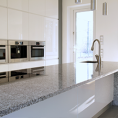How to Maintain the Beauty of Your Granite Countertops Over Time

Why Are Granite Countertops Popular?
Granite countertops are a favorite for kitchens and bathrooms due to their durability, natural beauty, and resistance to heat and scratches. Formed from molten rock, granite is incredibly hard and can withstand heavy use, making it ideal for high-traffic areas. With proper care and maintenance, granite countertops can retain their stunning appearance and functionality for many years. In this guide, we’ll explore how to maintain the beauty of your granite countertops over time, along with tips for caring for other popular countertop materials like quartz, quartzite, marble, porcelain, and dolomite.
Daily Cleaning and Maintenance for Granite Countertops
Keeping your granite countertops clean on a daily basis is essential to maintaining their beauty and longevity. Here are some tips for daily cleaning and maintenance:
- Use Mild Cleaners: Clean your granite countertops with a mild dish soap and warm water solution. Avoid using harsh or acidic cleaners, as they can damage the sealant and the stone itself.
- Wipe Spills Immediately: Promptly clean up spills, especially those from acidic substances like lemon juice, vinegar, or wine, to prevent staining.
- Soft Cloths and Sponges: Use a soft cloth or sponge to clean the surface. Avoid using abrasive pads or brushes that can scratch the granite.
How to Seal Granite Countertops

Use a soft cloth or sponge to clean the surface. Avoid using abrasive pads or brushes that can scratch the granite.
Sealing your granite countertops is crucial to protect them from stains and moisture. Here’s a step-by-step guide on how to seal your granite countertops:
- Choose the Right Sealer: Select a high-quality granite sealer designed for natural stone. Make sure it is appropriate for food preparation areas if used in the kitchen.
- Clean the Surface: Thoroughly clean the granite surface and allow it to dry completely before applying the sealer.
- Apply the Sealer: Follow the manufacturer’s instructions to apply the sealer evenly across the surface. Use a clean, dry cloth to spread the sealer in a circular motion.
- Let it Soak: Allow the sealer to soak into the granite for the recommended amount of time (usually 15-30 minutes).
- Wipe Off Excess: Wipe off any excess sealer with a clean cloth, ensuring there are no streaks or residue left on the surface.
- Cure Time: Allow the sealer to cure for the recommended time before using the countertop, usually 24 hours.
Preventing Damage to Granite Countertops
Preventing damage is key to maintaining the beauty of your granite countertops. Here are some tips to help prevent damage:
- Use Cutting Boards: Always use cutting boards when preparing food to avoid scratches and knife marks on the granite surface.
- Avoid Heavy Impact: Refrain from placing heavy objects directly on the countertop, as granite can chip or crack under excessive weight.
- Use Trivets and Hot Pads: Although granite is heat resistant, sudden temperature changes can cause thermal shock. Use trivets or hot pads for hot pots and pans.
Maintenance Tips for Other Countertop Materials
While granite requires specific care, other countertop materials like quartz, quartzite, marble, porcelain, and dolomite also have their own maintenance needs. Here’s how to care for these materials:
Quartz Countertops
Daily Cleaning: Quartz countertops are non-porous and resistant to stains and scratches. Clean with mild soap and water, and avoid using harsh chemicals and abrasive cleaners.
Sealing: Quartz does not require sealing due to its non-porous nature.
Quartzite Countertops
Sealing: Quartzite is a natural stone that is harder than granite and requires sealing to protect against stains and moisture. Seal annually.
Cleaning: Use pH-neutral cleaners and avoid acidic substances.
Marble Countertops
Frequent Sealing: Marble is softer and more porous than other materials, requiring frequent sealing (every few months) to protect against stains and etching.
Gentle Cleaning: Use mild, pH-neutral cleaners and avoid abrasives and acids.
Porcelain Countertops
Daily Cleaning: Porcelain is highly durable and resistant to stains and heat. Clean with mild soap and water.
Sealing: Porcelain does not require sealing due to its non-porous nature.
Dolomite Countertops
Regular Sealing: Dolomite is similar in appearance to marble but more durable. Seal regularly to maintain its resistance to stains.
Careful Cleaning: Clean with mild soap and water; avoid acidic or abrasive cleaners.
FAQs About Maintaining Granite Countertops
1. How often should I seal my granite countertops?
Granite countertops should be sealed every 1 to 2 years, depending on the level of use and the specific type of granite. Perform a water test by placing a few drops of water on the surface; if it absorbs quickly, it’s time to reseal.
2. Can I use vinegar to clean my granite countertops?
No, vinegar is acidic and can damage the sealant and the stone itself. Stick to mild dish soap and water or a cleaner specifically designed for granite.
3. How do I remove stains from granite countertops?
For organic stains, create a paste with baking soda and water, apply it to the stain, cover with plastic wrap, and let it sit for 24 hours. For oil-based stains, use a baking soda and water paste in the same way.
4. Are granite countertops heat-resistant?
Yes, granite is heat-resistant, but it’s still advisable to use trivets or hot pads to protect the surface from thermal shock and potential cracks.
5. Can I place heavy appliances on my granite countertops?
While granite is durable, placing excessively heavy appliances can risk cracking or chipping the surface. Use caution and distribute the weight evenly.
Conclusion: Keeping Your Granite Countertops Beautiful
Maintaining the beauty of your granite countertops involves regular cleaning, sealing, and taking precautions to prevent damage. By following these tips and guidelines, you can ensure that your granite countertops remain stunning and durable for many years to come. Understanding the maintenance needs of other materials like quartz, quartzite, marble, porcelain, and dolomite also helps you make informed decisions for your home’s countertops, keeping them all in pristine condition.






